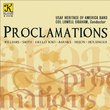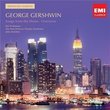| All Artists: Wolfgang Amadeus Mozart, Géza Anda, Salzburg Mozarteum Camerata Academica Title: Mozart: The Piano Concertos [Box Set] Members Wishing: 0 Total Copies: 0 Label: Deutsche Grammophon Release Date: 5/14/2002 Album Type: Box set Genre: Classical Styles: Chamber Music, Forms & Genres, Concertos, Historical Periods, Classical (c.1770-1830), Instruments, Keyboard Number of Discs: 8 SwapaCD Credits: 8 UPCs: 028946951026, 028946951026 |
Search - Wolfgang Amadeus Mozart, Géza Anda, Salzburg Mozarteum Camerata Academica :: Mozart: The Piano Concertos [Box Set]
![Mozart: The Piano Concertos [Box Set]](https://nationalbookswap.com/cd//l/07/8007/6098007.jpg) | Wolfgang Amadeus Mozart, Géza Anda, Salzburg Mozarteum Camerata Academica Mozart: The Piano Concertos [Box Set] Genre: Classical
|
Larger Image |
CD DetailsSimilar CDs
|
CD ReviewsDated anonymous | Los Angeles | 05/31/2007 (3 out of 5 stars) "In its time, this cycle of concertos was state-of-the art. One of the signal pleasures of this cycle today is how both Anda and the orchestra sound like they're having an enormous amount of fun. That comes through everywhere, even with the caveats below. Some of the performances hold up fairly well. 20 and 24, in particular, are still among the best performances of those concertos ever recorded. But overall, the sound and performance are dated. The orchestral playing in this set was never the greatest, too-often a bit ragged, and intonation in the strings is occasionally hit-and-miss. The winds were quite good for the time, being a bunch of big-time soloists of that era (including people like flutist Aurele Nicolet)...but even they sound a little out at times. Anda's playing was reasonably stylish for the time. Certainly better than that of many pianists who came later. But given the evolution of Mozart-style in the last 40 years, his playing now sounds a little too plain-jane. Nothing particularly wrong with just playing the music, but Anda is a bit too uninflected to be interesting. And, like nearly every other pianist who should know better, he plays the inferior publisher's solo part for #26...an unforgiveable act even then. Still, all-in-all, hard to beat for the money, and an adequate introduction to some of Mozart's greatest music, but only adequate. Anda is nearly eclipsed by Bilson and Gardiner. By Immerseel and Anima Aeterna, and would have been totally eclipsed by Levin and Hogwood, had they completed that much-lamented incomplete cycle. Barenboim, Ashkenazy, Uchida and Perahia are all tastelessly un-stylish. Each in their own special way. To my ears, those recordings are just about unlistenable, in their day, and now. Anda beats these handily. But they are not the standard these days. They never were. Andreas Staier and Concerto Koln give a sense of what's really possible in this music, and may have set a kind of standard for insight and virtuosity that has yet to be surpassed..it is truly tragic that Staier has not recorded any more Mozart concertos, beyond the four he did some seven years ago now. Too bad Ivan Moravec never recorded all the Mozart concertos. That would have been something to hear. The ones he did record are right at the top of the heap, for sure. I'd probably go with Brendel if you want a complete cycle with modern piano. Hard to beat Brendel in anything, although the ASMIF is a mediocre band at best, and you can only wish Brendel had recorded with someone else. In short, finding top-flight Mozart piano concerto recordings, even now, with the enormous number of them out there, is still a hit/miss proposition. And finding a complete cycle on modern piano that really *gets* Mozartean style, is damned near impossible. That would be a real milestone in recording history: a cycle of Mozart piano concertos, with modern instruments, that truly delivers stylistically, and the pianist plays with the kind of freedom Mozart would have, not following the score so slavishly as nearly all recordings do, including, especially, Anda, who should have known better. No-one's done it yet. But, maybe someone will, someday." Wonderful performances, artificial sound Jeffrey Chan | Silicon Valley | 01/28/2009 (5 out of 5 stars) "I don't know enough about the history of different styles of performances of the Mozart concerti to comment on how these fit into that picture, but I can say that I thoroughly enjoyed most aspects of these performances. Tempi are a little too quick in some places, and in that regard I suppose these show the modern tendency to play pieces faster than the composers probably intended. Comparing movement timings to multiple other recordings I have on hand it seems some are slower and several in this set are quicker. Despite that, the artistry and interpretation were definitely highly enjoyable to me. It's easy to get caught up in the fun of these lively, highly skillful and playful performances.
Regarding sound quality, in a sense these are excellent recordings. Piano and instrument sound are extremely good, if one is not looking for hall sound or a realistic presentation in acoustic space. I was aware that Deutsche Grammophon had the close-miking disease, but didn't know it extended back into the 1960s. Not even on stage does one hear instruments seemingly from the inside out, so while the instrument sound is very clear as usually results from close-miking, the perspective can't honestly be called realistic. Unfortunately too many recordings are close-miked. The sound of this recording probably could have been much better if not close-miked, assuming the DG engineers could learn to do it well. There are occasional signs of some high-frequency or dynamic limitations. Probably these are inherent in the microphones more than the original analog tape. Tape noise is not intrusive. DG's digital signal processing called "Original-image Bit-processing" seems to work very well. Signal integrity seems good and possibly improved over the original tapes. If the improvements are an illusion, it's a good one." |

 Track Listings (9) - Disc #1
Track Listings (9) - Disc #1



